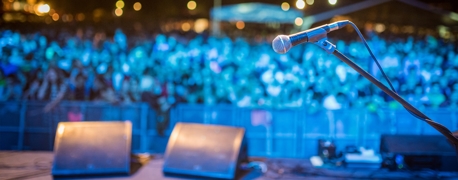Event Security: What Is Required for Concerts, Music Festivals & Sporting Events

Security is essential at music festivals, concerts, football games, and other live events. Regardless of the size or type of venue, proper measures must be taken to protect the fans. But how does event security work, exactly? Does there need to be a certain ratio of security officers to fans? Are the requirements different depending on the state, and is security private or provided by the city?
Disasters like the Astroworld crowd crush that claimed 10 lives or the rush at the doors of The Who concert back in 1979 that killed 11 makes answering these questions all the more important. Overcrowding, violence at live events, and deadly crowd surges have been happening for decades. It’s about time for something to be done about it – and proper security is one of the answers.
Event Security Requirements
Event security requirements will vary by state, county, and even city. It is the responsibility of the event organizers to ensure they comply with any and all security regulations.
This may include taking all measures necessary to ensure the environment is safe and secure, such as:
- Creating a detailed security plan
- Hiring a licensed and insured private security company
- Having enough private security officers at the event
- Having a certain number of police officers at the event
Each city or county has standard requirements regarding the number of security officers that must be present at an event, depending on its size and nature. Final security arrangements, including a detailed security plan, will be subject to final review and approval by the proper authority, such as the local police department.
With many live events, a combination of local law enforcement and private officers will be responsible for security during the show. That was the case at the Astroworld Festival, which had 528 police officers and 755 private security officers on duty, according to Houston Mayor Sylvester Turner. It seems like a lot of security personnel, but questions have arisen regarding the qualifications of the private security officers after one came forward and said he was hired via text message with no verification of his prior experience or qualifications.
In Texas, security personnel must be properly educated, licensed, and trained to work at any venue, including live events. Anyone who performs private security services without a license may be subject to prosecution.
Private Event Security Must Be Properly Licensed & Trained
Each state has its own requirements regarding training and licensing requirements for private security officers. These will vary depending on whether the license is for an armed or unarmed security guard, plus the jurisdiction itself.
For an unarmed security officer in Texas, for example, requirements include:
- A background check and drug screening
- Completion of security guard training through an approved school or instructor
- Passing a test on the security training course
- For armed security, an additional 30 hours of training and a firearm handling test
After completing these steps and submitting an application for their license, a security guard will be issued a “pocket card” that shows they are properly registered as a licensed security guard in Texas. This card is good for two years; it will need to be renewed every two years thereafter.
Why We Need Trained Security Officers at Live Events
Sporting events, music festivals, comedy shows, and concerts need security officers to keep everyone safe and ensure that the event runs smoothly. This is true at any event, from a family-friendly kids’ concert to a sold-out rock or rap festival. These officers need to be properly trained so they are not overwhelmed by a large crowd or even a few rowdy fans. They need to be able to identify and neutralize potential threats and respond to serious problems with the proper authority. Event security personnel are not there just to protect the performer. They’re there to keep every attendee safe.
Event security officers’ duties may include:
- Manning entrance and exit points at a venue
- Crowd control
- Diffusing a volatile situation, such as breaking up a fight
- Patrolling
- Responding to reports of drug use, violence, or other problems
- Watching surveillance cameras
- Identifying and removing trespassers (people without tickets)
- Apprehending criminals
- Guarding the stage and performers
- Performing CPR or first aid in a medical emergency
- Directing people on what to do and where to go in an emergency
- Helping any people who need assistance
Security guards at live events must be alert and they must be physically fit enough to perform their duties. They should take threats or reports of problems seriously and must coordinate with local law enforcement as needed to handle any problems that may arise.
Who Is Responsible for Providing Security at a Concert?
Responsibility for security at a concert or other live event will typically lie with the organizer or the venue itself. These parties are responsible for understanding security regulations and then adhering to these.
In addition to providing security personnel, this may include:
- Video surveillance
- Gates and fencing
- Metal detectors
- Adequate lighting
- Guest screening
- Security alarms
When proper security measures are not taken at concerts and other events, the results can be catastrophic. The crowd surge at Live Nation's Astroworld Festival is just one example. There have been many others, like the mass shooting at Route 91 in Las Vegas in 2017 or the suicide bomber at an Ariana Grande concert in Manchester, England, also in 2017. Fans should not have to worry about their safety or their very lives when they’re at a show.
Ask a Concert Injury Attorney
Until event organizers, promoters, and venues begin to take full responsibility for the safety of fans at concerts, sporting events, and festivals, our concert injury attorneys will be there to hold them accountable. At Arnold & Itkin, we’re known for getting results. Our concert injury lawyers have secured over $20 billion for the injured and wronged, and we have achieved these results by helping people overcome all odds after experiencing the worst situations. We’ve made corporations own up to their wrongdoing and pay for the suffering they’ve caused. We will continue to fight for what’s right, no matter what.
To learn more about our firm and how we can help you, call (888) 493-1629.


